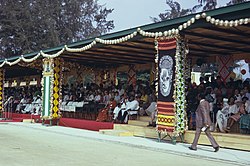IntroductionWelcome to the Pan-Africanism portal!
Bienvenue sur le portail panafricanisme!   Pan-Africanism is a worldwide movement that aims to encourage and strengthen bonds of solidarity between all indigenous peoples and diasporas of African ancestry. Based on a common goal dating back to the Atlantic slave trade, the movement extends beyond continental Africans with a substantial support base among the African diaspora in the Americas and Europe. Pan-Africanism can be said to have its origins in the struggles of the African people against enslavement and colonization and this struggle may be traced back to the first resistance on slave ships—rebellions and suicides—through the constant plantation and colonial uprisings and the "Back to Africa" movements of the 19th century. Based on the belief that unity is vital to economic, social, and political progress, it aims to "unify and uplift" people of African ancestry. (Full article...) Selected articleNégritude is a framework of critique and literary theory, developed mainly by francophone intellectuals, writers, and politicians of the African diaspora during the 1930s. Its initiators included Martinican poet Aimé Césaire, Léopold Sédar Senghor (the first President of Senegal), and Léon Damas of French Guiana. Négritude intellectuals disavowed colonialism, and argued for the importance of a Pan-African racial identity among people of African descent worldwide. The intellectuals employed Marxist political philosophy, in the black radical tradition. The writers generally used a realist literary style, and some say they were also influenced somewhat by the Surrealist stylistics. In 1932, the manifesto "Murderous Humanitarianism" was signed by prominent Surrealists, including the Martinicans Pierre Yoyotte and J. M. Monnerot. Selected biography
Issa Laye Thiaw (born 1943 at Sangué, Thies region of Senegal, died 10 September 2017, Senegal was a Senegalese historian, theologian, and author on Serer religion, Serer tradition and history. Selected historyThe Haitian Revolution (French: Révolution haïtienne [ʁevɔlysjɔ̃ ajisjɛ̃n]) was a successful anti-slavery and anti-colonial insurrection by self-liberated slaves against French colonial rule in Saint-Domingue, now the sovereign nation of Haiti. It began on 22 August 1791, and ended in 1804 with the former colony's independence. It involved blacks, mulattoes, French, Spanish, and British participants—with the ex-slave Toussaint L'Ouverture emerging as Haiti's most charismatic hero. It was the only slave uprising that led to the founding of a state which was both free from slavery, and ruled by non-whites and former captives. It is now widely seen as a defining moment in the history of racism in the Atlantic World. Its effects on the institution of slavery were felt throughout the Americas. The end of French rule and the abolition of slavery in the former colony was followed by a successful defense of the freedoms they won, and, with the collaboration of free persons of color, their independence from white Europeans. It represents the largest slave uprising since Spartacus's unsuccessful revolt against the Roman Republic nearly 1,900 years earlier. It challenged long-held European beliefs about alleged black inferiority and about enslaved persons' capacity to achieve and maintain their own freedom. The rebels' organizational capacity and tenacity under pressure inspired stories that shocked and frightened slave owners in the hemisphere. Selected cultureThe term Caribbean culture summarises the artistic, musical, literary, culinary, political and social elements that are representative of the Caribbean people all over the world. The Caribbean's culture has historically been influenced by that of African and Amerindian traditions. It has also been strongly influenced by that of its linguistic, economic, and cultural neighbor, the United States. As a collection of settler nations, the contemporary Caribbean has been shaped by waves of migration that have combined to form a unique blend of customs, cuisine, and traditions that have marked the socio-cultural development of the area. Selected imagesOrganisationsAll-African People's Revolutionary Party · African Society for Cultural Relations with Independent Africa · African Unification Front · African Union · African Queens and Women Cultural Leaders Network · Conseil de l'Entente · Convention People's Party · East African Community · Economic Freedom Fighters · Global Afrikan Congress · International African Service Bureau · International League for Darker People · Organisation of African Unity · Pan African Association · Pan-African Congress · Pan Africanist Congress of Azania · Rassemblement Démocratique Africain · Pan Africa Chemistry Network · Pan African Federation of Accountants · Pan-African Freedom Movement for East and Central Africa · Sahara and Sahel Observatory · UNIA-ACL · ZANU–PF
See also
& Festivals Photo by Helinä Rautavaara (1977) Publications
Films and TVAudios and videosDid you knowArchbishop Desmond Tutu and Thabo Mbeki, former President of South Africa. ... Selected quotesIn addressing imperialism at a Salisbury (Southern Rhodesia) meeting held on 9 April 1962, the former President of Zimbabwe Robert Mugabe delivered the following speech:
Pan-Africanism topicsCategoriesThings you can do
Related portalsAssociated WikimediaThe following Wikimedia Foundation sister projects provide more on this subject:
Discover Wikipedia using portals | |||||||||||||||||||||
© MMXXIII Rich X Search. We shall prevail. All rights reserved. Rich X Search
































